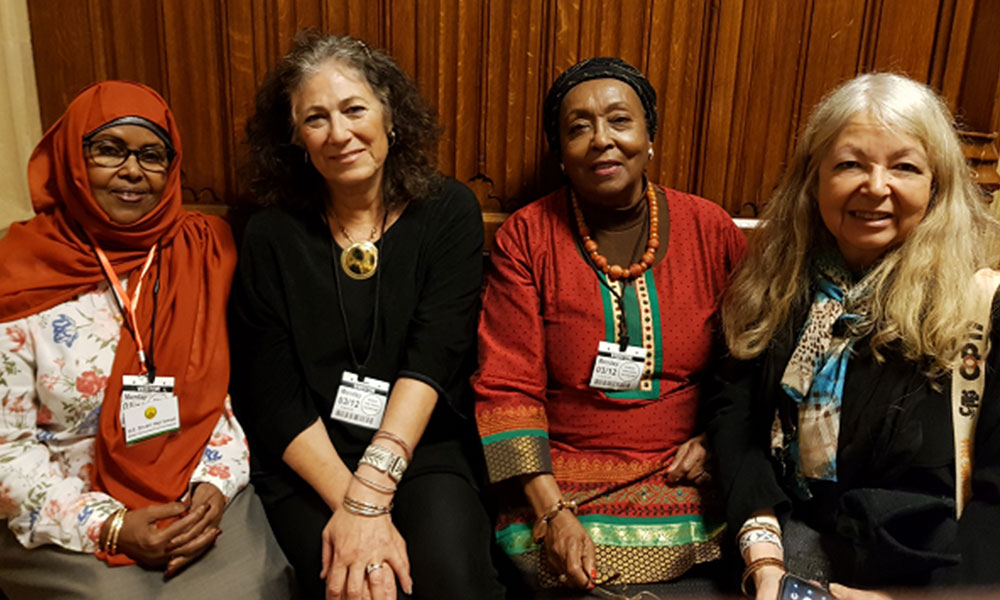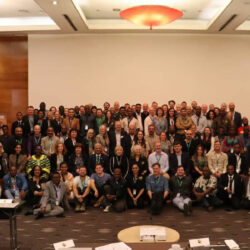Cheetah Conservation Fund Discusses Illegal Trade and Other Cheetah Issues with Somaliland Minister for Environment and Rural Development at UK House of Commons
-

- by CCF Staff December 7, 2018
FOR IMMEDIATE RELEASE
LONDON (7 Dec. 2018) – As part of ongoing efforts to combat illegal wildlife trade in the Horn of Africa, Dr Laurie Marker, Cheetah Conservation Fund (CCF) Founder and Executive Director, and Patricia Tricorache, CCF’s Assistant Director of Illegal Wildlife Trade, took part in a panel discussion at the House of Commons in London on 3rd December 2018. The event, Somaliland Beyond Drought: Saving Wildlife and Protecting the Environment, was hosted by Zac Goldsmith MP and Somaliland’s Mission to the UK and the Commonwealth. In addition to HE Shukri Haji Ismail Bandare, Somaliland’s Minister for Environment and Rural Development (MOERD), Somaliland panellists included Dr Edna Adan Ismail, Director of the Edna Adan Hospital, a non-profit facility that provides healthcare and training, and former Minister of Foreign Affairs (2003-2006).
“Few people realise that most cheetah stolen from the wild to be sold as pets are at best, a loss for conservation; at worst, likely to die. In addition, wildlife trafficking robs communities of their resources and welfare, since illicit activities breed unsafety, which in turn affects a community’s ability to engage in activities such as eco-tourism”, said Dr Marker. “This event allowed us to raise awareness about these issues and others, including the importance of proper rangeland management and integrated livestock-wildlife management in arid landscapes”.
During her opening remarks, Minister Shukri described the effects of a cyclic recurrence of natural disasters on Somaliland, such as droughts and cyclones, which has left thousands of people internally displaced. Compounded to this, Somaliland has seen a significant increase in the illegal taking of wildlife for the pet trade in the Gulf States during the last 10 years. Despite all odds, including lack of international recognition as an independent nation, Somaliland has been at the forefront of tackling these issues with a focus on putting an end to the illegal wildlife trade by taking a strong stance in prosecuting those involved. Because of the achievements of this small country that he described as a ‘beacon of hope’ in Africa, Goldsmith has taken an interest in exploring measures that can improve the situation for the country.
CCF began fighting the illegal cheetah trade in 2005 and has compiled cases of trafficking of live cheetah or cheetah products through research and direct reports from around the world. It works closely with law enforcement, government and NGOs in Somaliland and internationally to promote efforts that will lead to the confiscation of trafficked cheetahs and the prosecution of poachers. CCF also has a Somaliland-based team currently caring for 12 cheetahs confiscated during the last two years, among other species. Most of these animals are destined to spend the rest of their lives in captivity as they were taken from the wild at such young ages that they lack the skills to survive on their own.
In 2011, CCF began building a network in Somaliland and establishing working relationships with local government authorities. CCF works with Minister Shukri and a group of NGOs and academic institutions to develop strategies aimed at improving enforcement and educating the public on the legal and human aspects of wildlife trafficking. In early 2018, two wildlife officers with the Somaliland MOERD travelled to Namibia to attend a CCF-sponsored conference exploring the human dimensions of natural resource management, Pathways Africa, and later to CCF’s Centre for training in the handling of confiscated animals. On 28 August, Somaliland achieved a landmark victory in court when two subjects charged with wildlife trafficking were sentenced to three years in prison and a fine of U.S.$300 – the first successful conviction of cheetah traffickers in Somaliland.
“CCF also supports the government with the placement and care of confiscated cheetahs. We have travelled to Hargeisa to look after very sick cubs and help train staff in veterinary care. Unfortunately, Somaliland lacks the proper infrastructure to care for wildlife; over the last seven years authorities have confiscated 53 cheetahs, and some did not survive due to malnutrition and disease. To address this, we recently began a programme to build capacity for wildlife veterinary services that we hope will also awaken an interest in working with wildlife among students and youth”, said Patricia Tricorache.
There are less than 7,500 cheetahs left in the wild. Since 2005, CCF has recorded nearly 700 cheetahs and cubs taken for the illegal pet trade and smuggled through the Horn of Africa, mostly through Somaliland, to the Middle East. Less than 20% of these are known to have survived. Most smuggling goes undetected, however, so actual numbers are believed to be much higher.
“Not only does trafficking impact cheetahs, but the same people that smuggle cheetahs are also suspected of trafficking humans, drugs and other wildlife products. This is the first time a meeting like this has taken place. We need more opportunities like this to share ideas on how to stop the poachers and reduce demand, before even more harm is done”, said Dr Marker.

About CCF
Cheetah Conservation Fund (CCF) is the global leader in the research and conservation of cheetahs. Founded in Namibia in 1990, CCF maintains a research programme studying the biology, ecology and genetics of the cheetah and operates the only fully-equipped genetics laboratory at an in-situ conservation site in Africa. CCF has created a set of integrated programmes based on this research that address threats to the cheetah and its entire ecosystem, including human populations. CCF operates from the principal that only by securing the future of the communities that live alongside the cheetah can you secure a future for the species.
MEDIA CONTACTS:
Dr Laurie Marker – Namibia
Mobile/WhatsApp: +264-81-124-7887
Patricia Tricorache – USA
Mobile/WhatsApp: +1-305-766-8229
Susan Yannetti – USA
Mobile/WhatsApp: +1-202-716-7756
Related Reading


